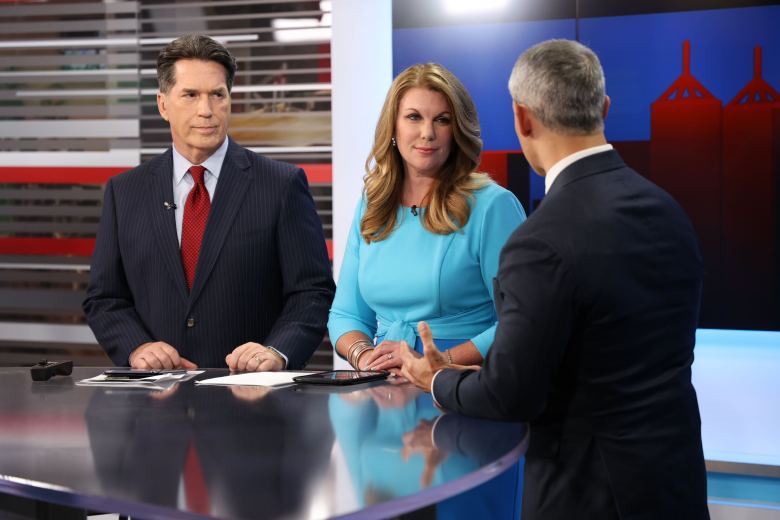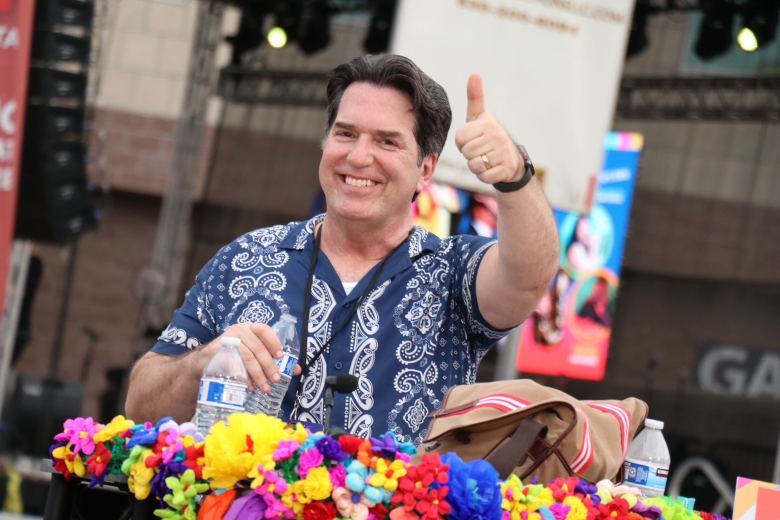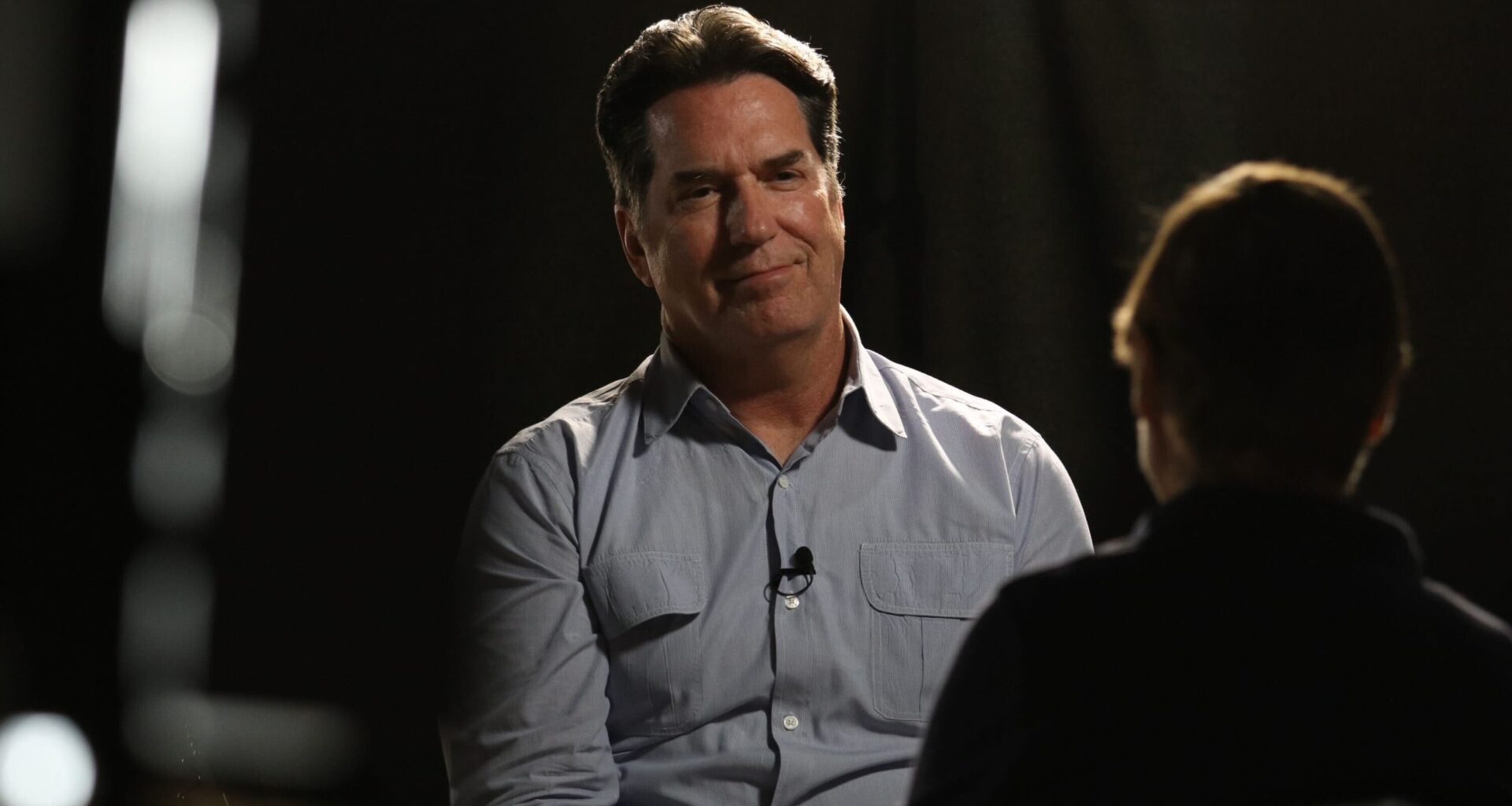After three decades as one of San Antonio’s most familiar faces, news anchor Steve Spriester is signing off from KSAT12.
Spriester joined the station in 1995 as a general assignments reporter and rose through the ranks to the weekday 6 p.m. anchor spot. He’s worked for years as an investigative reporter, and ultimately, became the lead anchor for the station’s 5 p.m., 6 p.m., and The Nightbeat newscasts.
Over the years, he’s covered five Spurs championships, multiple presidential conventions, devastating floods, and tragedies such as the Uvalde and Sutherland Springs mass shootings. His work has earned him three Lone Star Emmy Awards, two Telly Awards and recognition from the Texas Associated Press for Best Newscast.
Alongside breaking news coverage, Spriester developed community-focused projects such as Know My Neighborhood and Spriester Sessions, and produced special reports on homelessness and the 50th anniversary of the fall of Saigon.
His last day on air will be Aug. 27. Spriester has accepted a role as head of strategic communications at Perfected Claims, a legal advocacy firm.
He spoke with the San Antonio Report about his most defining moments, the changing media landscape, and what comes next. This interview has been edited for length and clarity.
 KSAT12 news anchors Steve Spriester, Myra Arthur and Ernie Zuniga during a recent newscast. Credit: Courtesy / Steve Spriester
KSAT12 news anchors Steve Spriester, Myra Arthur and Ernie Zuniga during a recent newscast. Credit: Courtesy / Steve Spriester
Q: You’ve been with KSAT12 since 1995. Looking back, what are some of your most defining moments in your career?
A:Gosh, I’ll probably leave that to other people but you know I have celebrated all of the Spurs championships. That’s been awesome. It’s something that I’ve loved to do with the city. I did a homeless special in the early 2000s that led to Haven for Hope. Bill Greehey from Valero and the mayor at the time Phil Hardberger got together with Patti Radle and decided that they needed to do something for San Antonio’s homeless population. That led to Haven for Hope. I did something this April that was very important to me. We documented 50 years after the fall of Saigon in Vietnam and talked to the men and women who fought, many who still feel the effects from the Vietnam War even now and I think the most important thing with that is they finally get a thank you for their service and they get recognized for the sacrifices that they made over there for that controversial war.
Q: Speaking of stories like that, it’s an emotionally taxing job and you’ve done it for 30 years. How did you balance the role of being a journalist and a human being in moments like those?
A:I think you have to be human in those moments. You can’t be somebody that you’re not and that’s kind of how I carry myself in being true to myself in everything. You know to empathize with what they’ve gone through or empathize with somebody who lost their job or somebody who has mental health [problems] or drug or alcohol addiction, and find themselves on the streets of San Antonio. This is gonna sound weird for a guy who talks for a living, but I pride myself on being a good listener if that makes sense.
Q:You’ve been a fixture in San Antonio households for decades. What do you hope your legacy will be?
A: You know, I think every journalist’s dream is to make a difference and I hope I’ve made a difference
Q: In your 30 years have you seen the media landscape here in San Antonio change?
A: It’s changed a lot. The digital online livestream aspect has changed a lot, but I fell in love with this city as much as I fell in love with KSAT. This is just a city that — in some corners diversity is a bad word — but I think it’s one of San Antonio’s strengths. And it’s one of the things that has kept me in San Antonio when I’ve had other opportunities to leave. I feel like San Antonio has taken me in and my family in a way that is special to me.
Q: What inspired you to do projects like Know My Neighborhood and Spriester Sessions that show a different side of journalism?
A: There are things that divide us so often that are brought out, but there are also so many things that unite us. I think when you look at different neighborhoods, whether it’s a neighborhood you know Southeast or Northwest we all have the same concerns: we all want good roads and sidewalks. We all want to be safe. We all want quality of life and lower taxes. By showing the different distinct neighborhoods of San Antonio, I hope people realize that we have more in common than we have differences.
To me it shows that there’s an appetite out there for uber local news and that’s what I hope KSAT continues to bring out. I know the San Antonio Report brings it out.
For me, it came out of a town hall meeting where we had a bunch of different neighborhoods from all over the city talking to us about what they thought we should be covering and that’s when I was like they’re all talking about the same things.
Q: What made you decide that now is the right time to step away?
A: You know when a lot of my friends left a year ago for the buyouts, it did not feel like the right time for me. Know My Neighborhood was a part of that, the Vietnam special was part of that, I had the elections coming up for mayor. I just had certain things I wanted to do.
I wanted to hit 30 years at KSAT so I didn’t take the buyout. But I think this time with the opportunity at Perfected Claims to do something that still makes a difference, perhaps on a bigger scale than what I was doing at KSAT was just an opportunity that was too good to pass up.
It wasn’t anything that KSAT did or didn’t do that weighed in on this; it was more me looking at signs that it was time. I’ve had a great run at KSAT, 30 years. A lot of people in my position don’t get to choose when it’s their time to step down and so going out on my own terms is also really attractive for me.
You know today was the first day I’ve been back since I made the decision and so we had a station meeting at 2 o’clock today and I thought I was mentally and emotionally prepared for it. I was not. I teared up and saw people I’ve worked with for decades tear up and it was hard, but I wanted them to hear from me why I made the decision and why you know there was a KSAT before Steve Sprester there will be a KSAT long after.
Q: Do you think you’ll miss that fast-paced nature of the newsroom or are you ready for a different rhythm?
A: Nope, I’ll miss it. Somebody today said ‘you know when that first big storm hits, are you gonna be sad that you’re not covering it or you’ll be happy that you’re not covering it?’ and I said ‘No, I think I’ll be sad.’
We did an election night livestream that we started 12 years ago when livestreams weren’t a thing. I flew back on July 5 from Dallas at my in-laws house to cover the flooding in the Hill Country. Just the adrenaline of giving people information that they need in critical times. That’s just the kind of thing that that drives me and that I want to be a part of because I think it’s so important. I will definitely miss those times.
 KSAT12 news anchor Steve Spriester at a recent Fiesta event. Credit: Courtesy / Steve Spriester
KSAT12 news anchor Steve Spriester at a recent Fiesta event. Credit: Courtesy / Steve Spriester
Q: If you could tell yourself back in 1995 one thing, what would it be?
A: Be patient. I started here as just a general assignment reporter and I did not think when I first started at KSAT that I would be here 30 years. I thought you know I’ll move on to do something else, somewhere else in TV and had opportunities to do that. That’s what speaks to this opportunity with Perfected Claims is I’ve had other opportunities to leave and decided to stay, but this opportunity was to get to pass up. More than anything else I’m grateful to the people of San Antonio and KSAT and more than anything our viewers cause they’ve been awesome.
Q: Do you see yourself ever returning to journalism in a different form maybe behind the scene, through a different medium or even teaching?
A: Maybe you never say never about anything. I’m excited about the fact that I’m still gonna do storytelling with Perfected Claims.They have an office in California and they advocate for people that had their home burned down. They have an office in Georgia where there’s been toxic chemicals in a stream there and people can’t sell their house or they’re getting sick through no fault of their own so the storytelling aspect of the advocacy journalism is still gonna be there but I don’t think I’ll ever turn my back on journalism. It’s something I feel so strongly about. I’m so passionate about it.
Q: What’s one thing that viewers might be surprised to learn about you?
A: Oh gosh, probably when I am not on the air, I am perfectly comfortable with a ball cap,shorts and a T-shirt. When I don’t have to wear a suit and tie and makeup five days out of the week, I am not going to. I am very relaxed when I’m not at KSAT, that’s for sure.
Q: What’s that first thing you plan to do when you no longer have to prepare for these daily broadcasts?
A: I’m just gonna spend some time with my family. It’s gonna be great to be home at night and you know I may fly up and see my Nebraska Cornhuskers play football or just do something I wouldn’t normally be able to do. That’s what I plan on doing is to take full advantage of the fact that my schedule is not as rigid as it used to be.
Q: What advice would you give to young journalists starting their careers today?
A: Be true to yourself and be kind to yourself.
